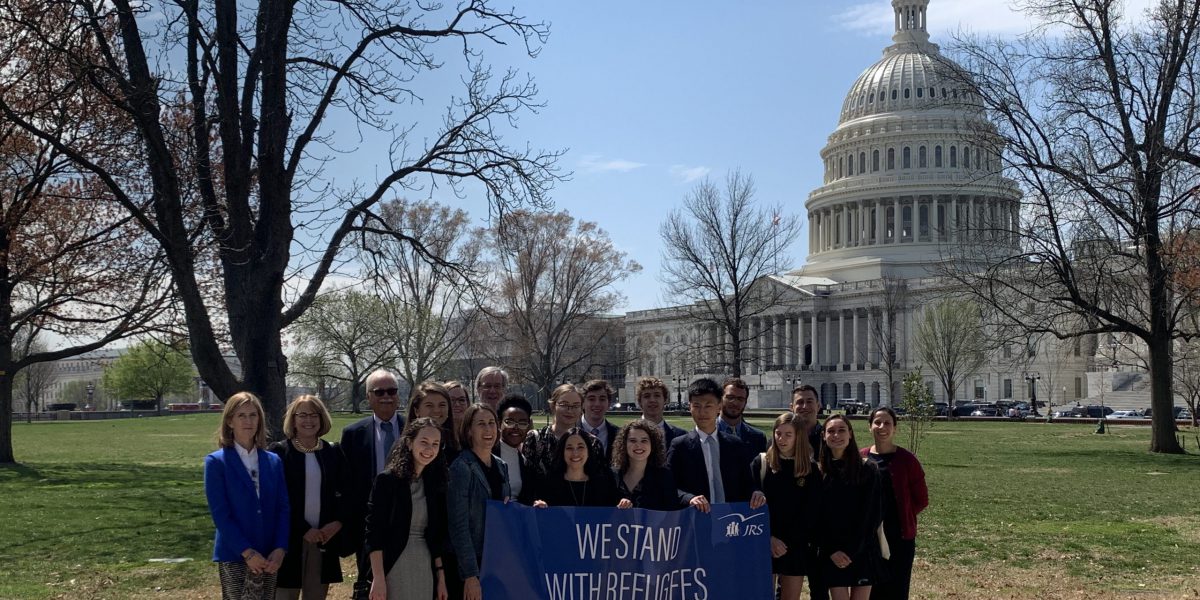
Tuesday, March 28th, marked JRS/USA’s eighth annual Advocacy Day in which 160 members of the JRS/USA community, representing 78 districts and Washington, DC, gathered to talk with their Senators and members of Congress about pertinent issues related to refugees and forcibly displaced people.
For this edition of INSIDER, we talked with the JRS/USA Director of Advocacy and Operations, Giulia McPherson, about how advocacy has grown as a core part of JRS’s mission.
“In addition to providing direct service through our programs, advocacy looks at the broader systemic barriers that refugees and forcibly displaced people face when they are trying to access those services or access the rights that would give them opportunities to grow and thrive,” McPherson joined JRS/USA in 2015, looking for a chance to work with a faith-based organization with her Catholic roots.
One of her first projects was a research paper focused on access to legal representation for asylum seekers. To amplify the results, McPherson organized an advocacy event at Georgetown Law with representatives from the Jesuit law schools who participated in the research. Then they visited Capitol Hill to talk with policymakers. This is where Advocacy Day began. McPherson saw an opportunity to focus more on the US government and deepen the relationships between policymakers and JRS/USA. “JRS/USA had always had an advocacy presence…but we hadn’t necessarily linked our advocacy to our programmatic work in a concrete way,” McPherson said.
McPherson explained that advocates can be most successful when they can leverage first-hand experience and expertise in conversation with their policymakers.
“We’re implementing programs funded by the US government and we’re working directly with refugees. We can convey the direct impact of those investments,” McPherson said, explaining how JRS as an organization is able to add gravity to advocacy messaging.
At this year’s Advocacy Day, the JRS community put this strategy into practice when they asked their representatives to cosponsor the Mental Health in International Development and Humanitarian Settings (MINDS) Act.
JRS offices around the world have integrated Mental Health and Psychosocial Support (MHPSS) assistance into 95% of their operations, from education to entrepreneurship programs. This bill would shine a spotlight on the need for a more robust integration of MHPSS in global health development programs and directly improve the well-being of refugees and forcibly displaced people. “[Advocating] is about educating ourselves and educating our policymakers,” McPherson said, addressing how disheartening it can be to speak with representatives year after year and not see positive changes.
Title 42, a pandemic-era public health measure that effectively closed the US – Mexico Border to those seeking safety, will be rescinded in May, but the Biden Administration has already set forth plans to continue to prevent people from seeking asylum.
“Advocacy work is a marathon, not a sprint,” McPherson said, encouraging the JRS community to hold onto hope and keep speaking out on behalf of refugees.
Through JRS/USA advocacy efforts, the FY23 Omnibus Appropriations package included $30 million for Education Cannot Wait (ECW), the UN global fund for education in emergencies and protracted crises. This was a $5 million increase from FY22.
In February, McPherson traveled to Geneva, Switzerland, for the ECW High-Level Financing Conference where 18 donors committed over $826 million to support ECW’s 2023 – 2026 strategic plan.
As protracted displacement increases, the barriers refugees and forcibly displaced people face require comprehensive and humane policy changes. The JRS community continues to show up and speak out on behalf of those who have to flee their homes.
For those new to advocacy, McPherson said, “you do not have to be an expert on these issues, you don’t have to answer every question…by showing up, that makes a difference.”



